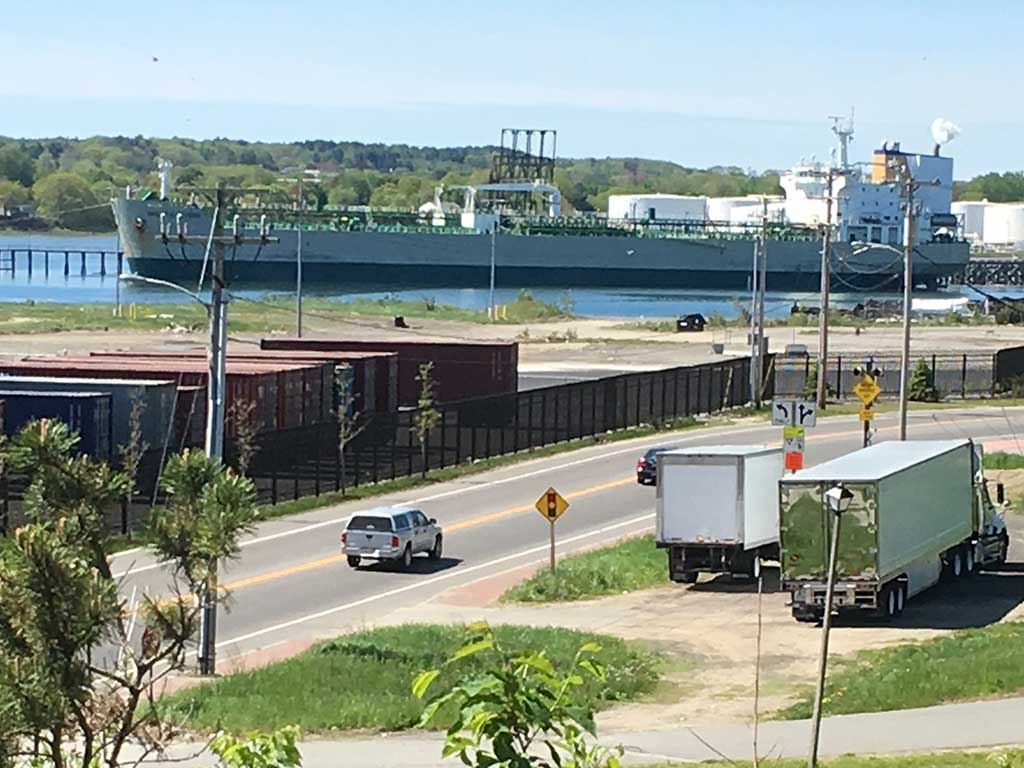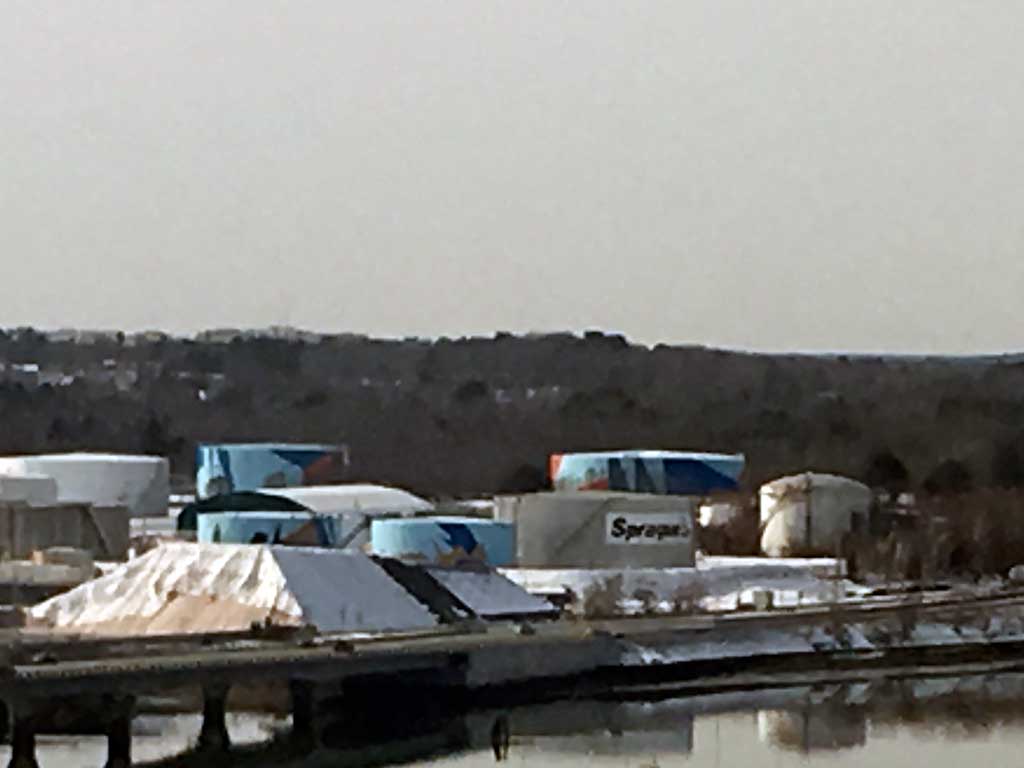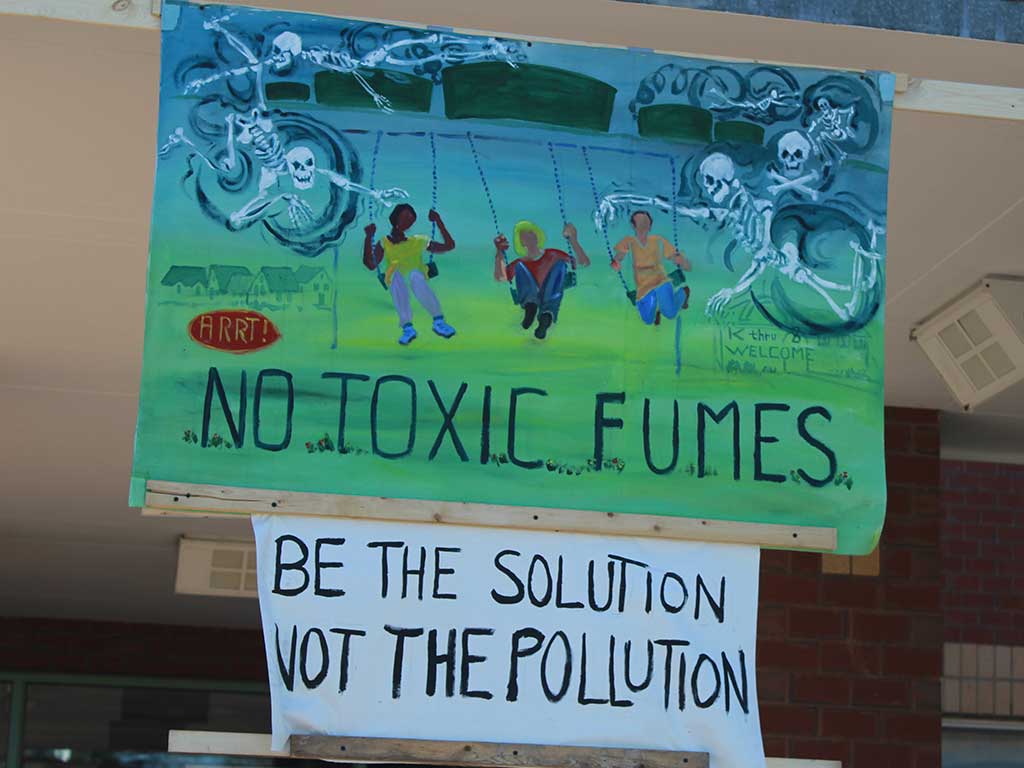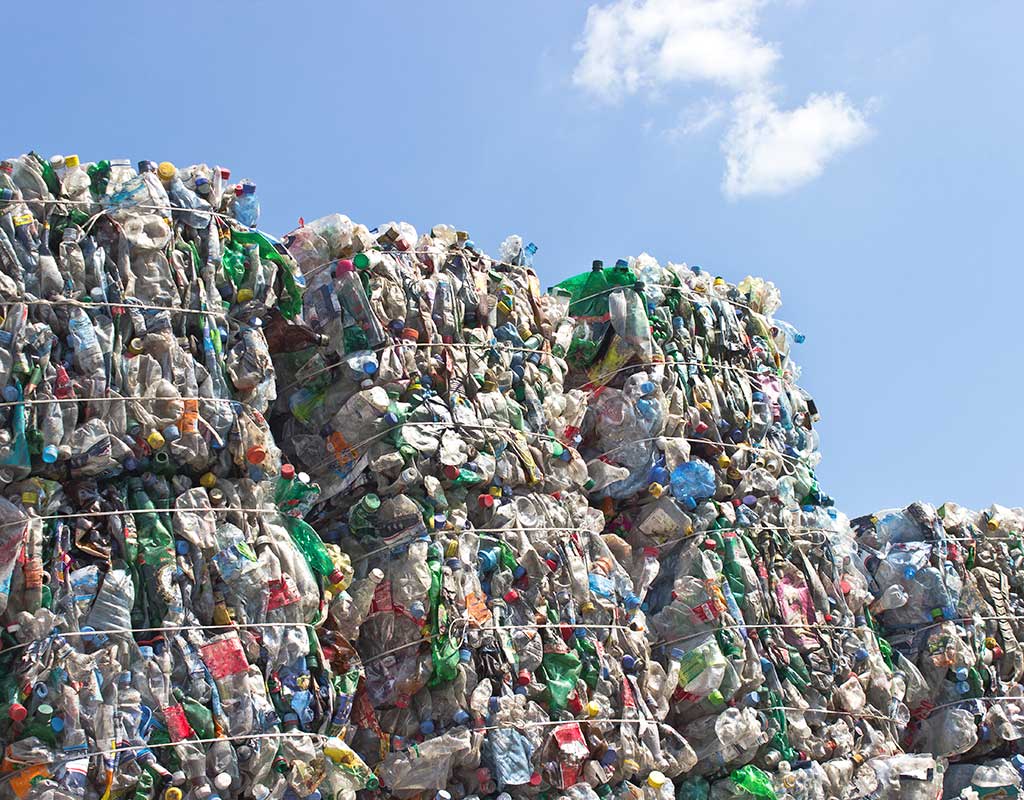CLIMATE JUSTICE FEATURE
Toxic Fumes in the West End
By Espahbad Dodd

The air smells like petroleum or burning rubber. Is this toxic stench safe to breathe? That’s what people in South Portland and Portland’s West End want to know.
The smells may contain VOC’s (Volatile Organic Compounds) coming from the South Portland tank farms – including those of Global and Sprague. Among the toxic, airborne chemicals emitted are Benzene, Ethylbenzene, Toluene, and Xylene. All of these chemicals irritate the eyes, nose, throat, and skin to varying degrees. Headaches, dizziness, lightheadedness, nausea, and vomiting are common reactions. Benzene, odorless, can be cancer-causing. Such fumes can be especially dangerous to the health of children, the elderly, and those living in close proximity. Several schools, daycare facilities, and housing for the elderly are nearby.
“More than 1,500 of our children attending schools near the tank farms are being exposed every day,” Roberta Zuckerman of Protect South Portland told the South Portland City Council last year. “Can we look them in the eyes and tell them that it doesn’t matter? Their health is the price we expect them to pay to support the status quo of doing business? Don’t we all have the basic right to breathe healthy air?”
Toxic Fumes Reach West End

As one of the largest volume oil ports on the Eastern Seaboard, South Portland is the home of 120 tanks. These tanks store petroleum products such as asphalt and bunker fuel (a thick, sludge-like kind of oil) which transporters must heat to keep from hardening. Depending on wind directions, fumes from tanks carry over the river into Portland’s West End.
I find the smell overwhelming sometimes when I walk through West End Cemetery. And West End resident Pamela Shaw takes the added precaution of checking wind directions before she goes to bed at night, so that she can close her windows if necessary.
Some of the tanks may be emitting as much as twice the amount of dangerous emissions than their licenses allow. In fact, the EPA has found that the heated tanks have the potential to emit more than 50 tons of VOCs. This is in violation of Global’s existing permit, which allows for only 21.9 tons. Regulators have fined both Global and Sprague for underreporting emissions. Global has agreed to minor modifications, and a draft consent decree with Sprague calls for the same.
Emissions Monitoring
Since an emission monitoring program began more than a year ago, Protect South Portland wants to see Global’s facility reclassified as a “major source emitter.” That would subject it to more rigorous regulations and stricter pollution standards.
Andrew Butcher, a resident of Danforth Street, across the Fore River from the tanks, works on environmental health and air quality issues at Greater Portland Council of Governments. He says the lack of monitoring and data collection has been frustrating. Over the past two years, Butcher has amassed over 150 complaints from West End neighbors. He also said the city has registered 100 complaints in just the last three to four months.
Residents Angered by Slow Response
Residents, seriously concerned about their health and the well-being of their families, are frustrated by the government’s slow, inadequate response. Therefore, a Clean Air Advisory Committee has been formed in South Portland to monitor the problem. Chelsea Conaboy spoke at a recent City Council meeting about her anger.
“I think we are angry that the company over many years violated the public trust by emitting far above what they’re permitted to emit,” Conaboy said. “I am angry thinking about the fact that after everything we’ve been through […] I will wake up one morning and smell fuel in the room where my three-year- and my five-year-old are sleeping.”
Similarly, when she learned about a consent decree with Global, Sabrina Shankman, a local resident and investigative environmental reporter, said that her thoughts, “like those of many other people, went to my kids, whose daycare center was a stone’s throw from the tanks, and who are sometimes surrounded by the stench… even in my backyard, about a mile from where the tanks are located. I wanted to know: Is it safe for my kids to be breathing this air? A year later, I still don’t know the answer, but I’m trying to find out.”
Battle for Clear Skies
A David vs. Goliath battle in 2013 pitted grassroots organizers and the city against Big Oil. That battle ultimately lead to the current Clear Skies Ordinance. But a federal court recently bounced a determination on the legality of the ordinance back to the Maine Supreme Court for a ruling on Home Rule. If residents vote down the Clear Skies Ordinance, then not only tank smells but the looming prospect of tar sands from Canada may be in their future.
Protect South Portland has a list of demands. They want 24/7 fence line emissions monitoring around Global’s facility, with ongoing public notification of results. They want Global to pay for and install specialized equipment called vapor recovery units (VRUs) to minimize emissions. And they want regulators to require Global to obtain a permit for larger emitters. So far, the companies have consistently resisted the need to install VRUs.
But most of all, residents want to know that what they are breathing is safe and they want the regulators to impose requirements on Global and the other companies operating in South Portland to ensure they can’t emit dangerous levels of these chemicals. They want to convince the Maine DEP that Global is a major emitter, rather than a minor one.
Toxic Fumes: If You Smell It, Report It!
And here’s something we can all do. “If you smell it, report it!” is a meme now circulating to help build public awareness of the problem. We encourage folks who live, work, or visit South Portland and Portland’s West End to report the smell, location, and any associated symptoms by logging in to SmellMyCity.org.
This self-reporting will help researchers determine just how many people the toxic stench may be affecting and how often. Also it will create the database needed to advocate for strong regulations to monitor and control these dangerous emissions. And consider reporting your observations directly to the city government at Fix It Portland so complaints are logged into their register, too.
For further information on South Portland tank farms, see the highly informative nine-part series by Sabrina Shankman at InsideClimate News, a non-profit news organization that focuses on environmental journalism. Quotes from Roberta Zuckerman, Chelsea Conaboy, and Sabrina Shankman are found in articles published by InsideClimate News.
Espahbad Dodd lives on State Street in the West End. He is a member of the Portland Climate Action Team and the primary editor of that team’s monthly Bright Ideas column in The West End News. Espahbad can be reached at espahbad@gmail.com. He welcomes feedback.
Disclosure: Publisher and Editor Tony Zeli is a board member of Green Initiatives Education Fund, an organization that that has advocated against tar sands in South Portland.





1 Comments
Pingback: Bright Idea: First Vote, Then Do This - The West End News